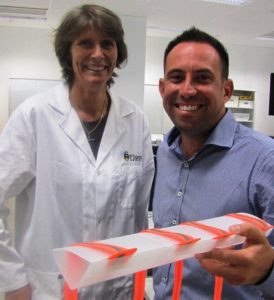
An innovative, light-weight splint to immobilise broken limbs has been developed with support from the Medical Device Partnership Program (MDPP) at Flinders at Tonsley.
The manufacturer, Fluoro Medical, will this year use an Accelerating Commercialisation grant from the Australian Government Department of Industry, Innovation and Science to ramp up production of the splint in South Australia.
State Manufacturing and Innovation Minister Kyam Maher says the ‘CAS Splint’, made by local company Fluoro Medical Pty Ltd , will be manufactured in large quantities in SA.
The company says the project could create up to 25 jobs during the next three to five years.
“The State Government funding – through the Medical Technologies Program – will provide 250 hours of research and development assistance from the Flinders MDPP, together with 30 hours of market intelligence which can be utilised by Fluoro Medical to craft a business case and commercialisation strategy at a later stage,” Mr Maher says.
Fluoro Medical managing director Scott Blackburn says the CAS Splint was developed to create a low-cost alternative to stabilise and support injured limbs. It is waterproof and compact enough to fit into regular first-aid kits.
Research undertaken by the Australian Institute for Health and Welfare indicates 65 per cent of falls result in the fracture of limbs, and currently the most common way to secure a limb is by using sling bandages with cardboard splints not found in most first-aid kits.
Because of the nature of the materials used in that process, the resulting support can easily succumb to moisture damage and, if applied incorrectly, even exacerbate the injury.
Professor Karen Reynolds, director of the State Government-funded MDPP, says Flinders medical device experts will run trials of the splint, which will help Fluoro Medical through the final development phase.
“The MDPP will undertake an end-user trial and survey to validate the current design of the splint and make recommendations for design modifications as required,” says Professor Reynolds.

